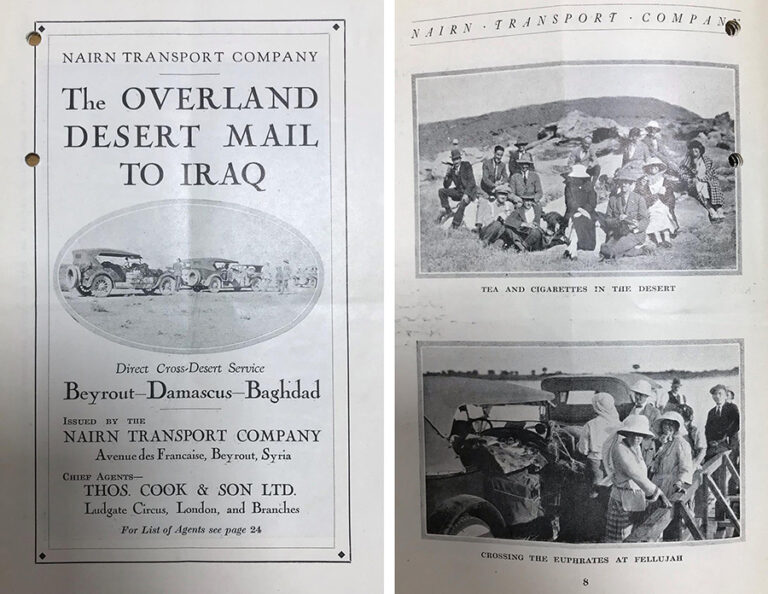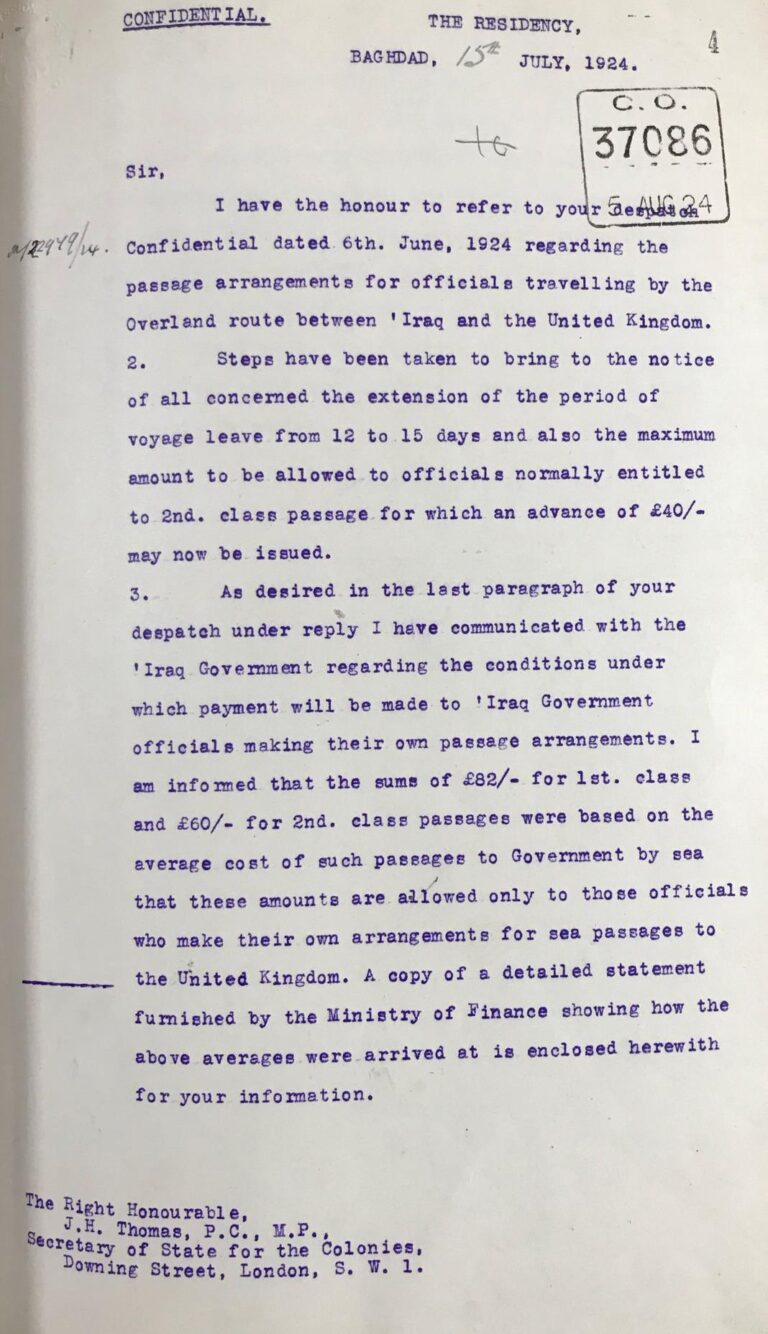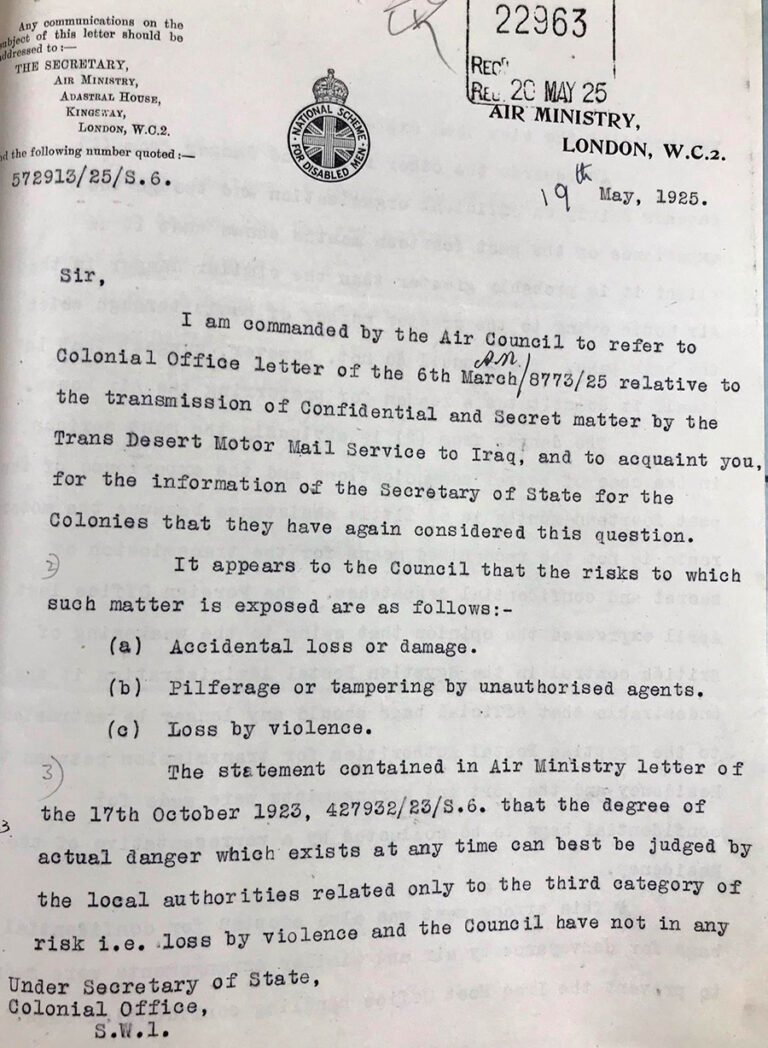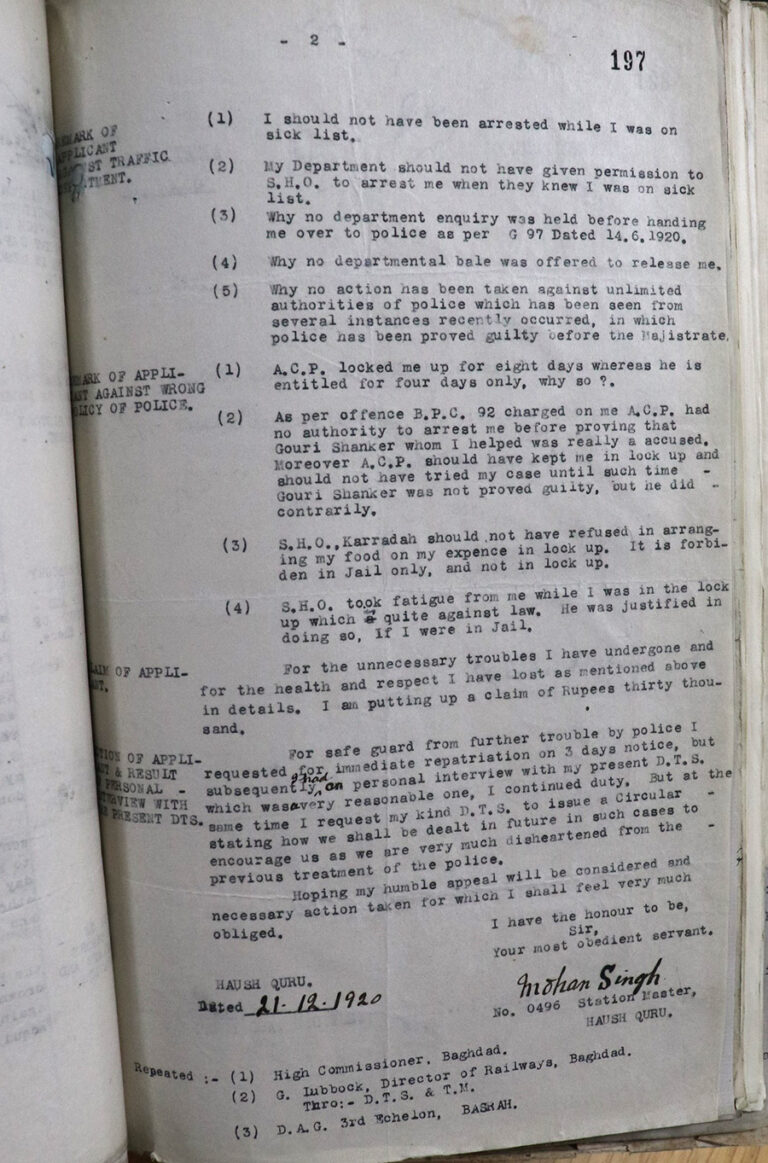This November, a group of three volunteers have finished a cataloguing project working on the series CO 730. This series contains original correspondence received by the Colonial Office from and about Iraq for the period during which it was under British administration. The cataloguing project means that the whole series is now keyword searchable in our online catalogue, Discovery.
Following negotiations at the Paris Peace Conference in 1919, the League of Nations placed Iraq (Mesopotamia) under British administration. The territory was formally created in 1921 and governed under the British Colonial Office until 1932 when it was handed over to Faisal bin Al-Hussein bin Ali Al-Hashemi, King Faisal I. The Colonial Office correspondence in CO 730 offers an unparalleled insight into British strategy, policy and attitudes during the years in which this new territory was formed and consolidated.

When we looked at the reader requests for the records in this series however, we had a surprise. Correspondence from the years 1921 to 1926 (those crucial first years in the history of Iraq) was being requested by researchers far less often than the correspondence from after 1926. The explanation for this ‘lack’ of use of the records from the early years could be found in how the records were described in our digital catalogue.
After 1926 the Colonial Office used a filing system that collected and recorded correspondence according to its theme, and letters on a similar topic were grouped together. When we created our digital catalogue, this thematic logic was carried over. As a result researchers could find correspondence from after 1926 using digital keyword searches. However, before1926 correspondence was collected together in large volumes in chronological order, and only organised by sender. This logic was again carried through into our digital catalogue. Correspondence was filed in volumes with opaque titles such as ‘Despatches from Individuals: Surname range I-Z’ and you couldn’t search for particular topics without using the original registers and indexes that were kept by the Colonial Office clerks.
Since 2020, that group of three volunteers has worked through these large volumes and created an entry in our digital catalogue for every single item of correspondence in the series. Thanks to the generosity of these individuals in giving their time and energy, 4,500 new entries have already been created in Discovery for CO 730. The remainder of the data will soon all be online. We anticipate that this new, detailed description of the contents of the series will make it much easier for readers to find and use Colonial Office correspondence, and we hope that it will contribute to new historical research and understanding of the British Mandate in Iraq.
The ‘Overland Route’
The letters provide an entry point into the full range of concerns of the British in Iraq, from establishing geopolitical supremacy, to the minutiae of details around finance and personnel. One theme that demonstrates this range very clearly is the correspondence around the ‘overland route’ across the desert between the Arabian Gulf and the Mediterranean. It had been among British key priorities during negotiations in 1919 to claim territory that offered continuous British control of the area between Palestine and the Arabian Gulf and provided an alternative route between Europe and India. Once British authority had been negotiated by treaty, the colonial authorities set about achieving dominance in the region, using both diplomacy and military action against local groups.
The letters in CO 730 describe the British strategies and crises in these attempts to gain political control of that stretch of land. New travel and communication infrastructures were instated almost immediately along routes between the Mediterranean and the Gulf. Within two years of the beginning of the British mandate a commercial travel service was providing transport and carrying mail across the desert, as can be seen from this brochure that was catalogued during the project.

Despite its political investment in this route, the Colonial Office debated whether it should be used for its own mail. Would that route be safe enough for letters that were politically sensitive? There was also extensive discussion on the use of the route by colonial officials who were taking periods of annual leave (CO 730/61/2) and also their wives (CO 730/41/60). A new route required the Colonial Office to rationalise its leave and expenses policies, discussions of liability and reliability. How did the journey time affect the number of days these officers were entitled to? Were the costs of travel (first and second class) reasonable compared to other potential routes? What kind of catastrophes that might befall the mail could the authorities be expected to anticipate?


Identities and rights
As might be expected, we see the workings of colonial bureaucracy in great detail but the series contains far fewer mentions of the experiences or welfare of non-British inhabitants of Iraq. Where we do come across non-British voices, they very vividly demonstrate the complexity of identity and migration in the Middle East in the early 20h century. There are many cases of local leaders contesting the decisions of the Paris Peace Conference and British authorities on state boundaries, religious conflict and the status of refugees. However, occasionally CO 730 also bears witness to the ways in which this new political territory generated debates about belonging and rights for individual migrants.
For example, the series contains a legal representation on behalf two Baghdad-born, French-educated Jewish businessmen, Sion and Kadouri Hanania who were trying to clarify their citizenship status (CO 730/27/67). A petition by Mohan Singh, an Indian who was employed as a station master in Iran, and claimed compensation from the British government for wrongful arrest in Iraq in 1920, offers insight into imperial-sponsored migration (CO 730/18/20).

Now that the content of CO 730 is more accessible to users, we hope it will be easier to find and highlight more instances that indicate the perspective and experiences of those who lived under the British mandate in the early 20th century.